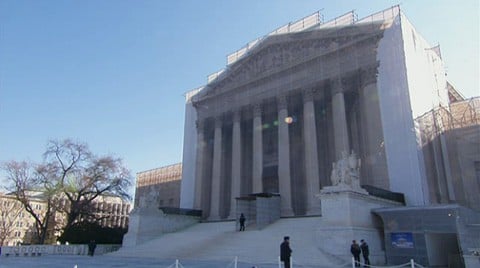Reports from inside of the Supreme Court DOMA arguments are beginning to emerge via Twitter.
Refresh for updates…
REUTERS:
Tweet: "Supreme Court conservative justices say they're troubled by Obama's refusal to defend marriage law."
SCOTUSblog:
Tweet: "#doma jurisdiction argument continues with no clear indication of whether a majority believes #scotus has the power to decide the case."
"Final update: #scotus 80% likely to strike down #doma. J Kennedy suggests it violates states' rights; 4 other Justices see as gay rights."
Tweet: "J Kennedy asks two questions doubting #doma validity but nothing decisive and Chief Justice and Kagan have yet to speak."
WSJ Live blog:
"Conservative justices sharply questioned why the Justice Department is refusing to defend DOMA as unconstitutional but yet enforcing the law and placing the gay-marriage question before the Supreme Court. Justices also questioned whether the case belonged before the court at all."
"Chief Justice John Roberts told attrorney Sri Srinivasan, the principal deputy solicitor general, that the government's actions were "unprecedented." To agree with a lower court ruling finding DOMA unconstitutional but yet seeking the Supreme Court to weigh in while it enforces the law is "has never been done before," he said."
"Justice Anthony Kennedy cited the controversial and "questionable" practice of presidential signing statements as an example. He said if the president doesn't think a law is constitutional then he shouldn't sign it. And said the same principle perhaps applied in this case– meaning if the president believes the law is unconstitutional, he shouldn't enforce it."
"Lawyer Paul Clement, representing the House, opened the main portion of the morning's arguments that examined DOMA's constitutionality. He faced several tough questions from the court's liberal wing—and from moderate conservative Justice Anthony Kennedy—that asked why the federal government had the right to define marriage, given that the issue was one traditionally reserved for the states."
"Mr. Clement said the issue of gay marriage implicates profound and deeply held views, but he said the key legal question in the case was a narrow one: Does the federal government have the flexibility to define marriage?"




